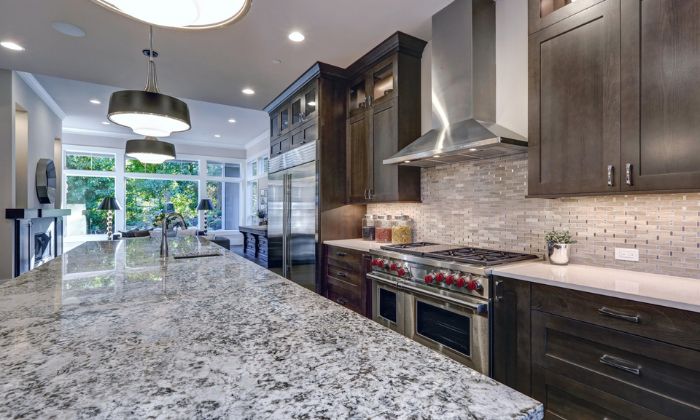Professional Granite Countertop Repair Service
Granite countertops are celebrated for their beauty and durability, making them a top choice for kitchens and bathrooms. However, even the toughest natural stones aren’t immune to damage. Over time, granite countertops may develop chips, cracks, stains, or dull areas, especially in high-traffic areas.
For homeowners, timely granite countertop repair is essential to maintain the value and appearance of these surfaces. This guide covers everything you need to know about professional granite countertop repair services, common issues, types of repair, and maintenance tips to help avoid future damage.
Table of Contents
Toggle
Common Issues Requiring Granite Countertop Repair
Granite countertops can suffer from a variety of issues that affect their look and functionality. Here are the most common problems:
Chips and Cracks
Chips and cracks on granite countertops often result from dropped items, heavy impacts, or natural wear over time. Repairing these imperfections typically involves using a color-matched epoxy filler to bond and fill the damaged area. This process helps create a seamless fix that blends with the countertop’s natural appearance, restoring its smooth surface.
Properly applied epoxy not only conceals the chip or crack but also reinforces the granite’s structure. After filling, the area is usually polished to ensure it matches the rest of the countertop, effectively extending its lifespan and maintaining its beauty.
Stains and Discoloration
Granite countertops, being porous, can absorb liquids and become stained if not sealed correctly. Oils, wine, and acidic substances are common culprits that can cause discoloration. To address this, professional granite repair services apply specialized cleaning methods to lift stains and may refinish the surface to restore its original color and shine.
Regular maintenance, such as sealing, can help protect granite countertops and keep them looking new by preventing liquids from penetrating the stone’s surface. These treatments ensure your granite maintains its natural beauty and durability over time.
Etching and Dulling
Etching on granite occurs when acidic substances, like lemon juice or vinegar, come into contact with the stone’s surface. The acid reacts with the minerals in granite, creating dull spots or etch marks that disrupt its polished finish. These marks aren’t stains but chemical damage that makes the surface look faded.
Restoring the shine requires resurfacing and polishing, a process where the top layer of granite is refinished to remove the etch marks and restore its glossy appearance. Regular cleaning with pH-neutral products can help prevent etching and keep granite looking pristine.
Loose Seams
Loose seams in granite countertops occur as the adhesive holding the edges weakens over time, leading to visible gaps between sections. These gaps can affect both the appearance and functionality of the countertop. To repair loose seams, the area is cleaned and the adhesive is reactivated or replaced. The seams are then carefully aligned and tightened to eliminate gaps.
Finally, a fresh layer of sealant is applied to ensure the repaired seams are properly sealed and protected from moisture and damage. This process restores the countertop’s smooth, seamless appearance and prevents further issues.
Types of Granite Countertop Repair Services Available
Professional granite countertop repair services offer various repair techniques depending on the type of damage. Let’s explore each service in detail:
Surface Repairs for Chips and Cracks
Surface repairs for chips and cracks in granite typically involve using epoxy products combined with granite dust. The epoxy is color-matched to the granite, and when mixed with the granite powder, it creates a filler that blends seamlessly with the surrounding surface. This technique is effective for repairing small chips and cracks, making the damage nearly invisible once repaired.
The epoxy hardens to restore the surface’s integrity, ensuring the repair is durable and aesthetically pleasing, maintaining the overall appearance of the granite. This method is commonly used for minor, non-structural damage.
Stain Removal and Surface Refinishing
Stain removal and surface refinishing for granite countertops involves a detailed, multi-step process. Professionals begin by identifying and removing stubborn stains caused by substances like coffee, wine, or oil. They then polish the surface to eliminate any imperfections and restore the granite’s smooth, shiny finish.
Finally, they work to bring back the natural color of the stone, making it look as vibrant as it did when it was first installed. This service is perfect for countertops that have become discolored or damaged over time, helping to restore both their appearance and durability.
Seam Repair and Leveling
Seam repair is the process of fixing the joints between two granite slabs, ensuring they are properly aligned and secure. It involves filling any gaps or cracks and re-leveling the slabs to prevent them from separating. Professional seam repair uses color-matched fillers to blend the seams with the granite’s natural pattern, minimizing visible lines.
This not only enhances the appearance but also strengthens the surface, ensuring long-lasting durability. Proper seam repair is essential for maintaining the integrity and aesthetic of granite countertops or surfaces, providing a seamless, smooth finish.
Polishing and Resealing
Polishing and resealing granite countertops are essential for maintaining their appearance and durability. Polishing removes etches and dull spots, restoring the stone’s shine. Resealing creates a protective layer that prevents stains and etching, keeping the surface smooth and resilient. Regular resealing is necessary to maintain granite’s natural beauty and protect it from damage over time.
Together, these processes ensure that your countertops remain visually appealing and functional, providing long-term protection against wear and tear. Regular care helps preserve the integrity and elegance of granite, making it an enduring feature in your kitchen or bathroom.
DIY Granite Countertop Repair vs. Professional Services
DIY granite countertop repair is often less expensive but may lack the durability and smooth finish of professional services. DIY kits typically involve using razor blades to scrape chipped areas or filling cracks with epoxy, but without experience, the results can be uneven or rough.
On the other hand, professional repair services utilize high-quality epoxy, color-matched fillers, and specialized tools, ensuring a seamless repair with precision. Experts can handle complex cracks, chips, and stains, providing a lasting, aesthetically pleasing result that DIY methods may not be able to achieve.
Factors Affecting the Cost of Granite Countertop Repair Services
The cost of granite countertop repair services depends on factors such as the extent of damage, the type of repair needed, and the location. Minor issues like small chips or cracks are typically cheaper to repair than larger, more severe damage. The type of repair required—such as surface refinishing, stain removal, or seam repair—also influences pricing.
Additionally, the location and accessibility of the countertop can affect repair costs, as well as the quality of materials used. Higher-quality epoxy and color-matched products ensure a seamless finish but may increase the overall cost, with repairs ranging from $50 to $100 or more.
Granite Countertop Maintenance Tips to Avoid Future Repairs
Regular maintenance can extend the life of your granite countertops and help prevent the need for costly repairs. Here are some tips to keep your granite in top condition:
Regular Sealing and Polishing
Regular sealing and polishing are essential for maintaining the beauty and durability of granite countertops. Sealing every 1-2 years creates a protective barrier that prevents stains from penetrating the surface, keeping your countertops looking pristine. Polishing not only enhances the natural shine of granite but also helps to prevent etching, which can occur from acidic substances.
Together, sealing and polishing preserve the countertop’s appearance, prevent damage, and extend its lifespan, ensuring that your granite surfaces stay both functional and aesthetically pleasing for years.
Cleaning Practices
To properly clean granite surfaces, use a mild, granite-safe cleaner to wipe them down regularly. Harsh chemicals, such as bleach, vinegar, and acidic cleaners, should be avoided as they can damage the protective sealant on the granite. This damage can lead to etching, dulling the surface and making it more vulnerable to stains and wear.
Always opt for gentle, pH-balanced cleaners designed specifically for granite to maintain the stone’s integrity and prolong its lifespan. Regular cleaning will also help keep your granite looking polished and prevent the buildup of dirt and grime.
Avoiding Common Mistakes
To prevent damage to granite countertops, it’s important to handle heavy items with care. Dropping heavy pots or pans can cause chips or cracks. Additionally, avoid sitting or standing on the countertop, as the added pressure can lead to stress cracks. Granite is a durable material, but it is not impervious to impact or excess weight.
By being mindful of these common mistakes, you can maintain the appearance and integrity of your granite surfaces for years to come, ensuring they remain functional and visually appealing in your kitchen or bathroom.
Preventative Measures
To protect your granite surfaces, use preventative measures like placing mats or trivets under hot cookware. This helps prevent heat damage, as granite can be sensitive to extreme temperatures. Additionally, always use cutting boards when preparing food to avoid direct contact between sharp knives and the granite.
This prevents small chips or dull spots from forming, preserving the smooth, polished look of your countertops. These simple steps can significantly extend the lifespan of your granite surfaces and maintain their aesthetic appeal.
Why Choose Us?
Our granite countertop repair service stands out because of our attention to detail, use of high-quality materials, and skilled technicians. Whether you’re dealing with a broken piece, cracked surface, or deep stain, we specialize in restoring granite countertops to their former glory. With years of experience in granite repair, we guarantee professional-grade results that last.
Conclusion
Granite countertops are a valuable investment, and with proper care, they can last for decades. However, when chips, cracks, stains, or etching occur, timely granite countertop repair is essential to maintain the countertop’s durability and beauty. Professional repair services offer a wide range of solutions, from surface repairs to seam leveling, polishing, and resealing, to keep your granite looking like new.
FAQs
Can a granite countertop be repaired?
Yes, granite countertops can be repaired. Chips, cracks, and stains can be fixed using epoxy products and color-matched fillers. Professional repair ensures a seamless and durable finish.
How much does it cost to change countertops to granite?
Changing countertops to granite varies depending on factors like the type of granite, installation fees, and the size of the countertop. Expect to pay around $50 to $200 per square foot.
How often should granite countertops be sealed?
Granite countertops should be sealed every 1-2 years to maintain protection against stains and water damage.
Can deep cracks in granite be repaired?
Yes, deep cracks in granite can be repaired. Professionals often use a combination of epoxy and granite dust to fill and seal the crack, restoring the countertop’s integrity.
What products are safe to use on granite?
Use granite-safe cleaners specifically designed for natural stones. Avoid acidic or abrasive cleaners, as these can damage the sealant and lead to etching.
